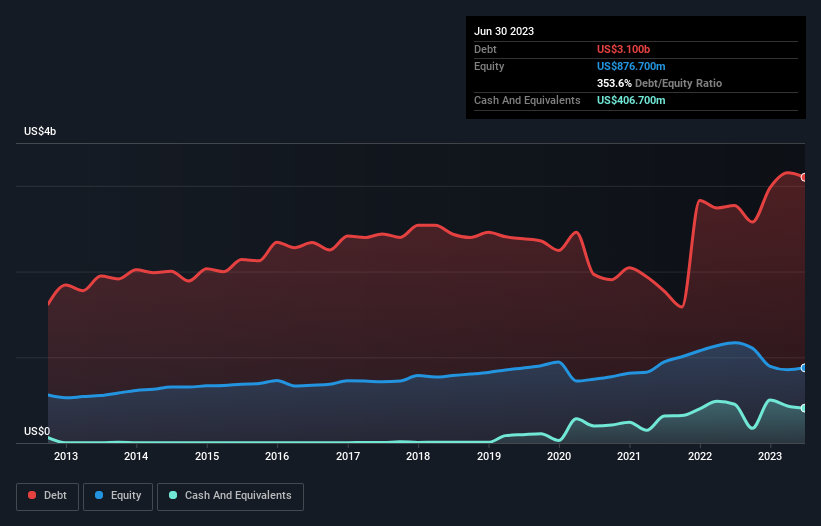- United States
- /
- Specialty Stores
- /
- NYSE:SAH
Sonic Automotive (NYSE:SAH) Use Of Debt Could Be Considered Risky

Warren Buffett famously said, 'Volatility is far from synonymous with risk.' So it might be obvious that you need to consider debt, when you think about how risky any given stock is, because too much debt can sink a company. We can see that Sonic Automotive, Inc. (NYSE:SAH) does use debt in its business. But should shareholders be worried about its use of debt?
What Risk Does Debt Bring?
Generally speaking, debt only becomes a real problem when a company can't easily pay it off, either by raising capital or with its own cash flow. Ultimately, if the company can't fulfill its legal obligations to repay debt, shareholders could walk away with nothing. However, a more frequent (but still costly) occurrence is where a company must issue shares at bargain-basement prices, permanently diluting shareholders, just to shore up its balance sheet. Of course, the upside of debt is that it often represents cheap capital, especially when it replaces dilution in a company with the ability to reinvest at high rates of return. The first thing to do when considering how much debt a business uses is to look at its cash and debt together.
See our latest analysis for Sonic Automotive
What Is Sonic Automotive's Net Debt?
The image below, which you can click on for greater detail, shows that at June 2023 Sonic Automotive had debt of US$3.10b, up from US$2.77b in one year. However, it does have US$406.7m in cash offsetting this, leading to net debt of about US$2.69b.

How Healthy Is Sonic Automotive's Balance Sheet?
We can see from the most recent balance sheet that Sonic Automotive had liabilities of US$2.00b falling due within a year, and liabilities of US$2.20b due beyond that. Offsetting this, it had US$406.7m in cash and US$400.6m in receivables that were due within 12 months. So it has liabilities totalling US$3.40b more than its cash and near-term receivables, combined.
This deficit casts a shadow over the US$1.74b company, like a colossus towering over mere mortals. So we definitely think shareholders need to watch this one closely. At the end of the day, Sonic Automotive would probably need a major re-capitalization if its creditors were to demand repayment.
In order to size up a company's debt relative to its earnings, we calculate its net debt divided by its earnings before interest, tax, depreciation, and amortization (EBITDA) and its earnings before interest and tax (EBIT) divided by its interest expense (its interest cover). Thus we consider debt relative to earnings both with and without depreciation and amortization expenses.
Sonic Automotive has a debt to EBITDA ratio of 3.9 and its EBIT covered its interest expense 3.6 times. This suggests that while the debt levels are significant, we'd stop short of calling them problematic. More concerning, Sonic Automotive saw its EBIT drop by 3.7% in the last twelve months. If that earnings trend continues the company will face an uphill battle to pay off its debt. There's no doubt that we learn most about debt from the balance sheet. But ultimately the future profitability of the business will decide if Sonic Automotive can strengthen its balance sheet over time. So if you want to see what the professionals think, you might find this free report on analyst profit forecasts to be interesting.
But our final consideration is also important, because a company cannot pay debt with paper profits; it needs cold hard cash. So we always check how much of that EBIT is translated into free cash flow. In the last three years, Sonic Automotive's free cash flow amounted to 45% of its EBIT, less than we'd expect. That's not great, when it comes to paying down debt.
Our View
We'd go so far as to say Sonic Automotive's level of total liabilities was disappointing. Having said that, its ability to convert EBIT to free cash flow isn't such a worry. Overall, it seems to us that Sonic Automotive's balance sheet is really quite a risk to the business. For this reason we're pretty cautious about the stock, and we think shareholders should keep a close eye on its liquidity. The balance sheet is clearly the area to focus on when you are analysing debt. But ultimately, every company can contain risks that exist outside of the balance sheet. Case in point: We've spotted 2 warning signs for Sonic Automotive you should be aware of, and 1 of them is a bit concerning.
If, after all that, you're more interested in a fast growing company with a rock-solid balance sheet, then check out our list of net cash growth stocks without delay.
New: Manage All Your Stock Portfolios in One Place
We've created the ultimate portfolio companion for stock investors, and it's free.
• Connect an unlimited number of Portfolios and see your total in one currency
• Be alerted to new Warning Signs or Risks via email or mobile
• Track the Fair Value of your stocks
Have feedback on this article? Concerned about the content? Get in touch with us directly. Alternatively, email editorial-team (at) simplywallst.com.
This article by Simply Wall St is general in nature. We provide commentary based on historical data and analyst forecasts only using an unbiased methodology and our articles are not intended to be financial advice. It does not constitute a recommendation to buy or sell any stock, and does not take account of your objectives, or your financial situation. We aim to bring you long-term focused analysis driven by fundamental data. Note that our analysis may not factor in the latest price-sensitive company announcements or qualitative material. Simply Wall St has no position in any stocks mentioned.
About NYSE:SAH
Sonic Automotive
Operates as an automotive retailer in the United States.
Average dividend payer and fair value.
Similar Companies
Market Insights
Community Narratives




